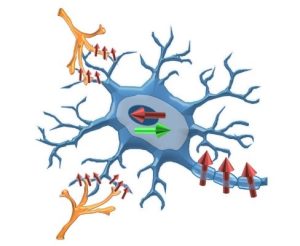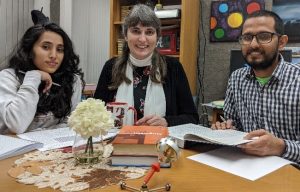
From the February 2020 Desktop News | How does the brain learn, store, and process information? This is the central question driving the MEMONET project―a group of multidisciplinary researchers whose goal is to study the brain and apply their discoveries to create a brain-inspired, spin-based artificial intelligence.
Dr. Claudia Mewes, an associate professor of physics at UA, is one of five academics working on the project. Mewes, who specializes in spintronics and magnetic materials, is joined by researchers concentrating on neuroscience, systems biology, bioinformatics, computational biology, and machine/deep learning. Her role is to take the information learned by the other scientists and apply it to a physical design, creating a brain-inspired computer that outpaces even the fastest supercomputers we have today. She hopes that the team’s work will have a large impact on people’s everyday lives.
“This might be able to transform all aspects of our lives,” Mewes said. “You could potentially have health screenings by this artificial intelligence that would tell you what kind of health risks you have. You could use this to help with security screening and threat recognition. You could even use it to help people with disabilities by allowing us to study brain damage or disorders in a controlled environment.”
Over the next two years, the team will work to harness brain activity and biomolecular data to understand the brain’s learning and memory functions. Then, the researchers will use this data to emulate network-driven brain learning functions to create a materials-based, brain-inspired computer.

The group, which formed at a National Science Foundation Ideas Lab, was recently awarded a $2 million collaborative grant from the NSF’s Harnessing the Data Revolution Division. The award will help the team research together, as well as travel to each other’s institutions to share their research. For Mewes, the multi-disciplinary, collaborative aspect of the team is possibly the most important.
“I think to make a real breakthrough, you need to work together because you really need to understand how different things work,” Mewes said. “It’s really unique to have so many disciplines in one group.”
The team will hold a workshop about brain-inspired computing at the Bryant-Conference Center at the University of Alabama on May 27, 2020. This workshop will showcase the expertise and challenges in this new research field.